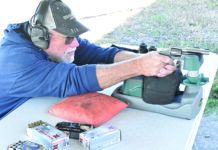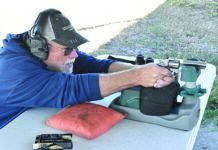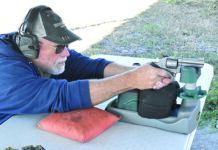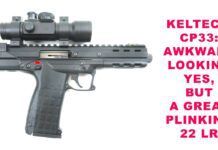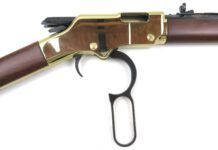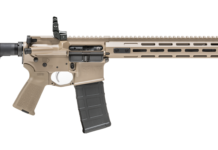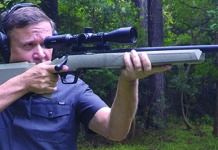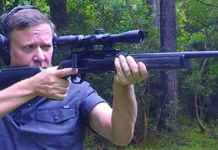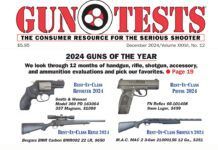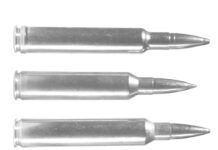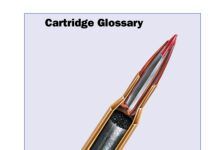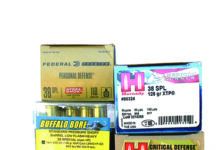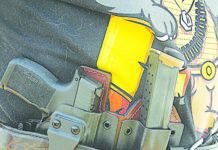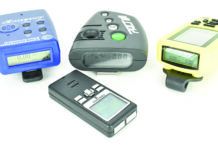According to the 16th Edition of Cartridges of the World, development on the 223 Remington case started in the late 1950s and was adopted by the U.S. military in 1964. As of this writing, the cartridge’s use in M16/M4 variants make the pair the longest-serving rifle/ammunition combo in our nation’s history. One of the reasons for that longevity is that both the platform and the round lend themselves to further development, including different powders, barrel twists, barrel lengths, bullet weights, bullet shapes, bullet construction, sighting systems, and much more.
The 223 Remington (the military version is called the 5.56 NATO and is slightly different) may easily be the number-one-selling centerfire rifle round in the U.S. right now. While the 223 may be the most popular centerfire rifle round in the U.S. at this point, we have no intention of claiming it is the best — for anything. But many people forget how many roles there are in which it serves very well, such as a varmint and small-game hunting round, along with, believe it or not, long-range shooting.
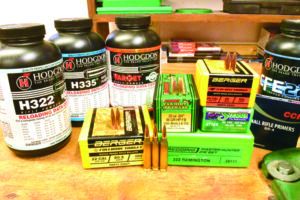
We selected three rifles from three companies to see how well and how easily they fired the 223 Remington cartridge. The first was a Ruger Hawkeye Predator 17122, $1359. The second was a CZ Model 527 03019, $785. Last was a Tikka T3X Varmint JRTXH312, $999. We wanted to test bullet weights from across the spectrum. Since that kind of selection was impossible to find during the ammo drought, and because we have several decades of experience in loading good 223 rounds, we rolled our own. We relied heavily on the Lyman 50th Edition Reloading Manual and Hodgdon’s online reloading sources at Hodgdon.com. We used bullets from Barnes (36-grain Varmint Grenade 30171), Berger (55-grain Flat Base Varmint 22311 and the 80.5-grain Fullbore Target 22427), as well as from Sierra (69-grain Tipped Match King 7169). We tested various loads, using all Hodgdon powders: H322, H335, Varget, and CFE 223. We also made exclusive use of CCI BR4 Benchrest primers and Lapua brass.
Gun Tests Grade: B+
$1359
Remington set the rifle world on its ear in 1962 with the introduction of the Model 700 centerfire rifles. Timed to coincide fairly closely with the intro of the new 7mm Remington Magnum cartridge, the Model 700 began life to great reviews and outstanding sales. Their quality, features, and accuracy are primary reasons that we now have “pre-64” and “post-64” rifles from Winchester, who found themselves in a price war in which their current production models could not be competitive. Some of Winchester’s design changes, such as omitting controlled-round feeding, received less-than-enthusiastic responses.
| Action Type | Bolt |
| Overall Length | 42.0 in. |
| Barrel Length/Twist | 22.0 in., 1:9 in. |
| Overall Height w/o Scope Mount | 6.7 in. |
| Weight Unloaded | 8.0 lbs. |
| Weight Loaded (55 grain, 5 +1 rounds) | 8.2 lbs. |
| Sight Radius | NA |
| Action Finish | Brushed stainless |
| Barrel Finish | Brushed stainless |
| Magazine Capacity | 5 |
| Magazine Type | Internal box with hinged floorplate |
| Stock | 3-color Green Mountain laminate |
| Drop at Comb | 0.5 in. |
| Drop at Heel | 0.75 in. |
| Bedding | None |
| Buttplate | Thin rubber |
| Length of Pull | 13.75 in. |
| Receiver Scope-Base Pattern | Ruger |
| Trigger Pull Weight | 2.4 lbs. |
| Safety | Three-position wing safety |
| Warranty | None listed |
| Telephone | (334) 949-5200 |
| Website | Ruger.com |
| Made In | New Hampshire, USA |
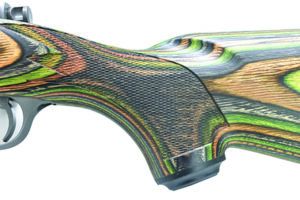
Ever the visionary, Bill Ruger, Sr. saw the potential opening in his industry and introduced his first bolt-action rifle — the Model 77 — in 1968. He understood that price mattered and is quoted as saying that he wanted a rifle that “could be purchased with one week’s take home pay.” Ignoring those who said it could never be done, Mr. Ruger pioneered the use of investment casting for important parts of a rifle — namely the receiver and bolt. Those were less expensive to produce, and extensive testing has shown that cast bolts can actually be stronger than a machined piece. Our Hawkeye Predator represents the third generation (at least) of improvements to the base design, and we were pleased with what we saw when we opened the box.
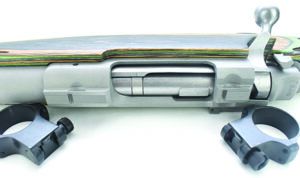
We like the look of a traditional, finely-figured wooden stock, such as the Winchester Model 70 Featherweight or a Remington 700 CDL (or the CZ 527). Our Hawkeye Predator sports a stock with some of the same elegant lines but is made out of three-color laminate. While not as pretty as Turkish walnut, the laminate should do a better job of resisting moisture and maintaining point of impact. The greens, tans, and grays mix well together and provide their own bit of camouflage. We found good checkering around the wrist and fore end of the stock, along with two sling-swivel studs mounted fore and aft. Inletting around the action was good, and a thin recoil pad is provided. Instead of standard bedding, the Ruger uses an angled forward action screw that draws the action down into the stock. This kept the stock nice and tight, but we suggest that, if you are going to remove the action from the stock for any reason, you check torque settings on the action screws carefully so the action could be replaced properly. The 22-inch medium-contour cold-hammer-forged barrel is free-floated for most of its length, though it’s still very tight in the channel.
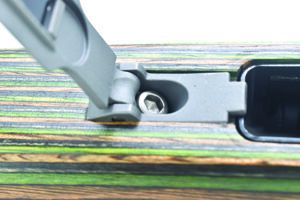
As mentioned, both the receiver and the bolt are investment cast. The receiver had integral scope mounts, which do a great job of securing the rings to the rifle. The bolt featured a non-rotating Mauser-type controlled-round-feed extractor and a pivoting blade-type ejector. Feeding and ejection were consistent and positive. The bolt was released via a lever on the left-rear of the receiver. The three-position safety was easy to reach and manipulate as it rotates around the bolt shroud from the right side of the bolt. The action was built to allow a longer case than the 223, so a small spacer is employed at the rear of the follower. We have seen similar actions that make it difficult to load the magazine properly because some of the cartridges inevitably were inserted a bit too far to the rear. The Ruger felt like it self-centered and loading was not an issue. We measured the two-stage trigger at a bit under 2.5 pounds. It had a crisp break with a bit of overtravel. The bottom metal was actually solid steel, with a flush-mounted release that should not allow things to be opened unintentionally.
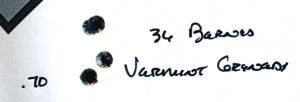
The Ruger liked to have the bolt operated enthusiastically if we wanted the empty to eject well, but everything worked perfectly otherwise. The rifle averaged 1.19 inches per group for multiple five-shot strings fired with three different kinds of ammunition. This was the least accurate of the three rifles in this test (but not by much), so we graded it down a half a notch for that placement. It showed a preference for heavier bullets, with better results from the Berger 55-grain Flat Point and the Sierra 69-grain Tipped Match King.
Our Team Said: For those who do their predator hunting in cold or inclement weather, the Ruger Hawkeye Predator might be a great choice because of its stainless parts and laminated stock.
223 Remington Range Data
| Barnes 36-grain Varmint Grenade | CZ Model 527 | Ruger Hawkeye Predator | Tikka T3X Varmint |
| Average Velocity | 3786 fps | 3726 fps | 3595 fps |
| Muzzle Energy | 1146 ft.-lbs. | 1110 ft.-lbs. | 1033 ft.-lbs. |
| Best Group | 0.70 in. | 0.99 in. | 0.96 in. |
| Average Group | 1.19 in. | 1.25 in. | 1.47 in. |
| Berger 55-grain FBHP | CZ Model 527 | Ruger Hawkeye Predator | Tikka T3X Varmint |
| Average Velocity | 3289 fps | 3278 fps | 3235 fps |
| Muzzle Energy | 1322 ft.-lbs. | 1313 ft.-lbs. | 1279 ft.-lbs. |
| Best Group | 1.00 in. | 0.93 in. | 0.44 in. |
| Average Group | 1.23 in. | 1.17 in. | 0.62 in. |
| Sierra 69-grain TMK | CZ Model 527 | Ruger Hawkeye Predator | Tikka T3X Varmint |
| Average Velocity | 2884 fps | 2848 fps | 2806 fps |
| Muzzle Energy | 1275 ft.-lbs. | 1243 ft.-lbs. | 1206 ft.-lbs. |
| Best Group | 0.72 in. | 0.86 in. | 0.44 in. |
| Average Group | 0.82 in. | 1.15 in. | 0.64 in. |
All testing was done at American Shooting Centers (AmericanShootingCenters.com) in Houston. Multiple five-shot groups were fired from each load tested. Muzzle velocities were determined via LabRadar ($559, MyLabRadar.com). All shots were fired from a Caldwell TackDriver shooting bag (Brownells.com, $49) aided by a T.A.B. Gear rear bag (TabGear.com, $39). For optics, we chose the Vortex PST II 5-25x50 with their EBR-7C reticle. This is a first focal plane, MRAD scope that has done yeoman’s duty for us in the past (OpticsPlanet.com, $999).
Value Guide: Short-Action Bolt Rifle Scores
| Gun Name | Issue | Grade | Comments |
|---|---|---|---|
| CVA Cascade CR3907C 350 Legend, $658 | Jul. 21 | A | Our Pick. Outstanding trigger and tons of features on a value rifle. Tied with the Savage M110 Hog Hunter. |
| Masterpiece Arms MPA BA MPR PRO 6mm CM, $2499 | Apr. 21 | A | Our Pick. A heavy, yet graceful beast of a rifle. The MPA is one of the most popular rifles on the PRS tour. |
| Christensen Arms MPR 801-03035-01 6mm CM, $1799 | Apr. 21 | A- | Lightest sample included in this group, tested for a sport that prefers heavy rifles, and it still almost won. |
| Ruger Precision Rifle 18032 6mm Creedmoor, $1599 | Apr. 21 | B+ | Good accuracy and dependability. We would have liked a crisper trigger and a wide, flat fore end. |
| Savage M110 Elite Precision 57558 6mm CM, $1999 | Apr. 21 | B+ | Least accurate with the Federal ammo. Black Hills and Berger ammunition were much better. |
| Savage Arms 110 Hog Hunter 223 Rem., $599 | Feb. 2021 | A- | Oversized bolt, adjustable iron sights, adjustable LOP, a box magazine, and a threaded barrel. |
| Christensen Arms Ridgeline 801-06015-00 6.5 PRC, $1793 | Jan. 2021 | A | Our Pick. Accurate with factory ammunition — even better with reloads. Carryover winner from Nov. 2020. |
| Seekins Precision Havak Pro Hunter 2 0011710059-F 6.5 PRC, $1895 | Jan. 2021 | A | Outstanding accuracy. We loved the stock and the trigger. |
| W’by Mark V Backcountry 6.5 RPM, $2249 | Jan. 2021 | B+ | Beautifully put together, but downrange accuracy wasn’t up to what we saw with other rifles. |
| Bergara Premier M’tn 2.0 BPR28-65PRC 6.5 PRC, $1999 | Nov. 2020 | A | A 100% carbon-fiber stock and trim 24-inch barrel make this a premier mountain rifle. |
| Browning X-Bolt Max LR 035438294 6.5 PRC, $1180 | Nov. 2020 | A | A little longer and a little heavier than our other test rifles. Beanfield rifle rather than a mountain rifle. |
| Savage M110 Hog Hunter 57534 350 Legend, $487 | Jul. 20 | A | Our Pick. Compact size with a short, stiff, accurate barrel and a great trigger. Straight-wall chambering. |
| Ruger American Ranch Rifle 26985 350 Legend, $442 | Jul. 20 | F/B+ | First sample failed when the bolt disassembled itself. The replacement rifle wasn’t all that accurate. |
| Winchester XPR Hunter 535741296 350 Legend, $635 | Jul. 20 | A- | A full-length rifle that looked great and handled well; dropped off half a grade for its just-average accuracy. |
| Winchester M70 F’wt SS 535234220 308 Win., $951 | Apr. 20 | A | Our Pick. Smooth handling, very good accuracy and classical styling. |
| Tikka T3x Lite Stainless JRTXB316 308 Win., $748 | Apr. 20 | A- | Best Buy. Functional polymer stock, the smoothest bolt in the group, and the best out-of-the-box trigger. |
| Remington Model 7 CDL 26423 308 Win., $798 | Apr. 20 | A | A nice piece of wood, a good trigger and a compact 20-inch barrel on a rifle that could really shoot. |
| Ruger Hawkeye Compact 37139 308 Win., $691 | Apr. 20 | B+ | This rifle has a short length of pull and a 16.5-inch barrel. Could be a great truck gun. |
| Browning X-Bolt Micro Midas 22-250 Rem., $879 | Dec. 2019 | A | Our Pick. This is trim rifle from Browning is made for the small-statured or still-developing hunter. |
| Howa Model 1500 Youth 22-250 Rem., $529 | Dec. 2019 | A | Best Buy. With youth- and adult-length stocks available, this is a great rifle. |


